How Long Does It Take Accutane To Clear Up Acne
If you're here right now, I'm willing to bet you've already spent a few dozen hours contemplating/deep-dive-Googling Accutane and everything about it: the potential side effects, the before-and-after photos, the real-life stories, and the first-person experiences. And I know this because not only have I lived through acne—I'm talkin' a constant rotation of blackheads, whiteheads, and cysts on my face at all times—but I've also taken isotretinoin, aka the generic drug name for Accutane (which, FYI, isn't on the market anymore, but everyone still refers to isotretinoin as Accutane anyway).
And because I've been down the research hole myself, I also know just how important it is to have first-person stories about isotretinoin that are real—ahem, not just the horror stories you see on sketch websites—and accurately depict all aspects of isotretinoin. Because despite what you've heard, dermatologists agree that Accutane isn't actually as scary as it's made out to be (muuuch more on that below), and that the vast majority of patients who take isotretinoin are, after their course, totally fine.
This content is imported from {embed-name}. You may be able to find the same content in another format, or you may be able to find more information, at their web site.
But, hey, I get it—you want details. Which is why I chatted with nine women about their before-and-after experiences with isotretinoin, from a few who finished their doses just a year ago, to some who finished theirs a decade ago, along with expert commentary from dermatologists. Keep reading to find out everything you've, well, already been Googling for hours/days/years, starting with…
What is Accutane?
Isotretinoin, commonly referred to as Accutane (note: Accutane was a brand name for isotretinoin and is no longer manufactured), is a vitamin-A derivative that, when taken orally, minimizes the oil production in your skin. "Accutane permanently shrinks your oil glands so they can't be stimulated as easily anymore," Mona Gohara, MD, dermatologist and associate clinical professor at Yale School of Medicine, has told Cosmo . Basically, isotretinoin slowly shuts down the party in your pores, so acne has a hard time setting up shop on your face.
How long does it take to see results on Accutane?
Usually, you'll start to see some results from Accutane after a few weeks, with bigger results around three months, and best results after six months. But—but!—your results are almost guaranteed to vary, because when it comes to isotretinoin, there's no universal dose or timeline; it all depends on your weight, your dosing, the severity of your acne, how well your body tolerates the medication, and your dermatologist's guidance.
That being said, many patients tend to take 40-60mg of Accutane a day for six months—though, again, how many milligrams you take each day and for how long is based on your weight and health. For people with adult female acne (AFA), i.e., women over the age of 25 with stubborn, persistent, hormonal acne, some dermatologists will prescribe a lower dose of Accutane over a longer period (think: seven to nine months) to minimize the chance of relapse. Again, it all super depends.
Does Accutane work forever?
Ideally, yes, Accutane is a permanent fix to major acne breakouts. But in reality, even the best-adhering patients can still get the occasional tiny zit (because we're all human, and humans sometimes accidentally sleep in their makeup, or stress out too much, or partake in a bit too many cocktails), though they'll rarely experience acne as severely as before.
"I would say only five percent of my patients go on isotretinoin a second time, either because their acne came back in full, or because they're getting some breakouts that they don't want to deal with again," says Dr. Gohara. "Another five percent get a little bit of acne again that clears up with retinoids or antibiotics, and the other 90 percent never see a pimple again."
Is Accutane bad for you?
Most dermatologists hail Accutane as the closest thing to an acne cure that exists, but that's not to say Accutane isn't a serious drug with serious potential side effects—it is, and everyone can respond differently to the medication. But does isotretinoin deserve the scary reputation you see on the internet? Definitely not (except, of course, when we talk about its known risk of causing birth defects, which is why regular blood tests, pregnancy tests, and birth control is required while taking the drug).
But in terms of the other out-there side effects you hear about, I once polled a handful of dermatologists who, collectively, had written more than 2,200 isotretinoin prescriptions in their careers. They said out of all their patients, fewer than 15 of them had serious problems while taking Accutane—the effects of which were resolved with a lower dose or stopping treatment altogether. Again, as with any medication, everyone's body responds differently, which is why your doctor will be your BFF during your Accutane journey.
Now, ready to get into those before-and-after photos and first-person stories? Thought so. Let's get into it:
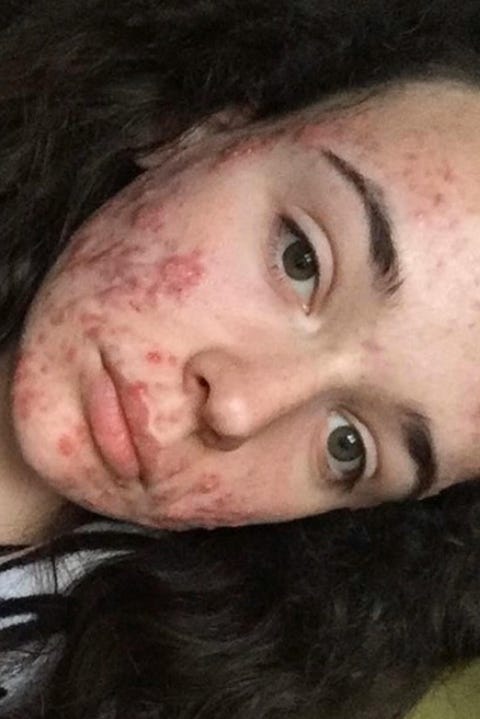
Courtesy Image

Courtesy Image
✨ Nine months post-Accutane ✨
A few months before I decided to start isotretinoin, I developed a very rare, very severe type of acne called acne conglobata, which left my face covered in deep, itchy, leaky, and incredibly painful cysts. It affected every aspect of my life, and I honestly felt like a victim to my own skin. I ended up going on isotretinoin for a little over eight months, and for the majority of that time, I was on 30mg: a lower dose than the usual 40-60mg, but the perfect dose for me.
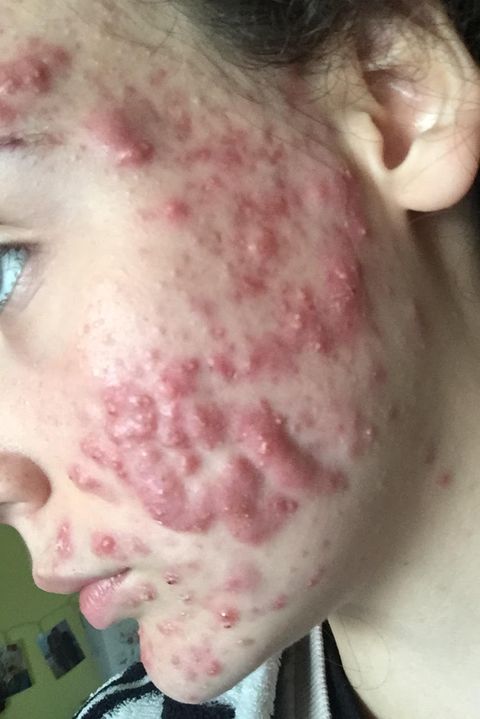
Courtesy Image
I had pretty much all the side effects that you hear about with Accutane: I was tired all the time, no matter how much sleep I got; my skin dried out to the point of getting little flakes everywhere; I couldn't exercise without getting a headache; if I stood up too long my back would ache. The worst side effect for me was the dry eyes, and I do think it affected my mental health a bit—I just felt more anxious and didn't have any motivation. But, that's also why my dose was lower: to keep my mental health and the side effects in check.
Thankfully, all of my side effects started to subside a month after I finished Accutane, and I noticed my energy levels rising after about two weeks. I still have dry eyes nine months later, and I still break out before my period. But by "break out," I mean a few tiny spots on my face—nothing like before. Still, all of the side effects were so worth it to me, because isotretinoin saved my skin—it genuinely changed my life.
A dermatologist's take:
"Accutane, aka isotretinoin, shrinks the glands in your skin that produce oils," says dermatologist Mona Gohara, MD, associate clinical professor at Yale School of Medicine. "When you shrink those glands, your organs—including your eyes—will be drier, but this side effect usually goes away after you finish your dose."
As for Mariah's lower energy levels? Another common, yet annoying side effect. "Some reports suggest that fatigue is dose-dependent, meaning the higher your dose of isotretinoin, the more likely you are to experience it," says Marisa Garshick, MD, of Medical Dermatology & Cosmetic Surgery in New York City. "In general, though, most people find this side effect to be temporary."
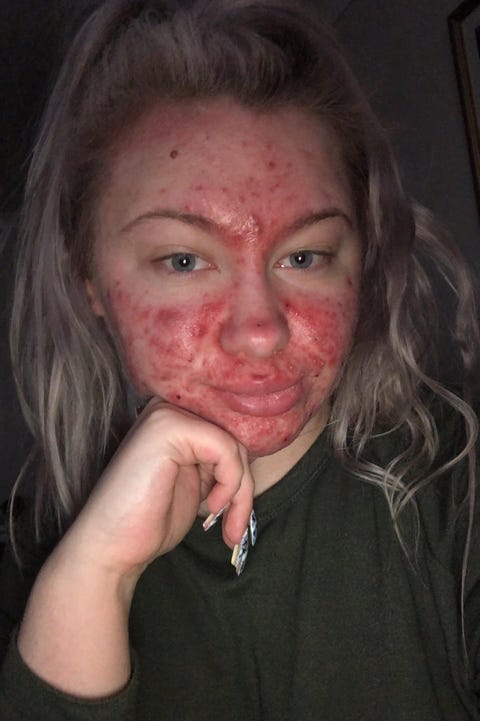
Courtesy Image
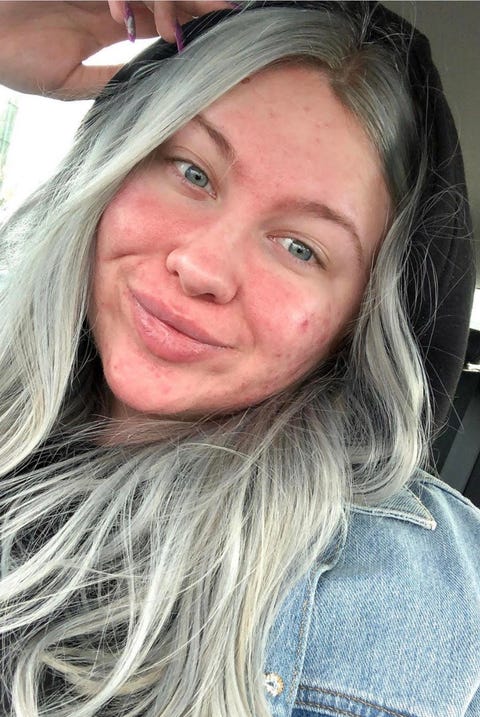
Courtesy Image
✨ Nine months post-Accutane ✨
Before isotretinoin, my skin was so oily that even setting powder couldn't take away the shine, and my face was covered in inflamed breakouts. My dermatologist ended up starting my Accutane dosage at 20mg the first month, then bumped me up to 40mg for three months, then had me on 60mg for the last two months.
This content is imported from Instagram. You may be able to find the same content in another format, or you may be able to find more information, at their web site.
Throughout my course, I dealt with pretty bad eczema on my arms and a dry scalp toward the end, and I also dealt with continuous headaches (though they were persistent enough that I stopped noticing them after a while, so it actually wasn't the end of the world). The only remaining side effect I have nine months after stopping Accutane is the eczema. It's still on my arms, and I've also noticed it becoming apparent around my scalp, but it isn't nearly as bad as it was when I was on Accutane.
As for my acne, I do get the occasional cyst or whitehead now, though nowhere near as severely as before. It actually took me a few years to finally go through with isotretinoin because of how scary it's made out to be, but for me, the whole thing was generally fine. I do feel really proud of myself for going on it despite my fears, though, and if I needed to, I would probably do it all over again.
A dermatologist's take:
"Dryness is far and away the most common side effect of isotretinoin" says Dr. Gohara. "Most patients can expect some degree of dry lips, dry skin, dry eyes, and sun sensitivity while they're taking it." Though eczema certainly isn't the norm, it also isn't uncommon: "Eczema comes along because the drug is essentially sucking the oils out of your skin, which is good for your acne, but not great in terms of skin moisture," she says. "I tell my clients to swap harsh soaps and washes for gentle, hydrating cleansers, then moisturize with heavier creams as opposed to lighter lotions."
Taking isotretinoin? Fight dryness with these 4 products:
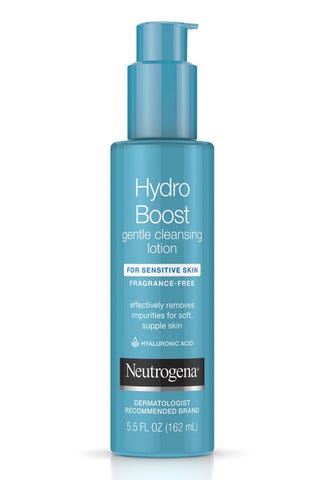
Hydrating Cleanser
Neutrogena Hydro Boost Gentle Cleansing Lotion
Infused with hyaluronic acid (a humectant that draws moisture to the skin), this non-stripping face wash helps hydrate skin while you cleanse.
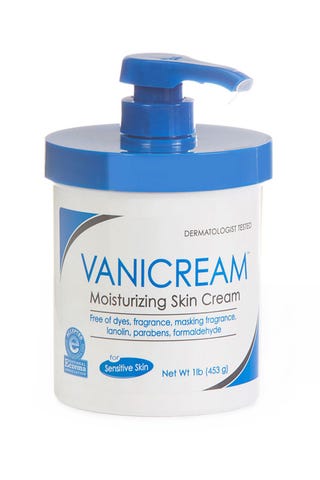
Soothing Face Cream
Vanicream Moisturizing Skin Cream
Slather on this moisturizing cream both morning and night to minimize dryness and flaking. The gentle formula is free from potential irritants, like synthetic fragrance and dyes.
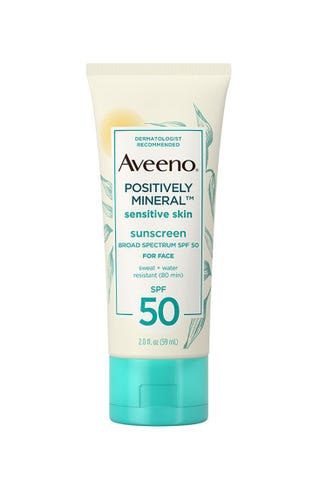
Gentle Sunscreen
Aveeno Positively Mineral Sensitive Skin Sunscreen
Any sunscreen is better than no sunscreen, but if your skin is red or sensitive, opt for a broad-spectrum mineral formula made with zinc (like this one)—it's less likely to irritate your skin.

Moisturizing Lip Balm
Aquaphor Lip Repair Ointment
When your lips are chapped and cracking, only Aquaphor will do. The combo of petroleum jelly, shea butter, and chamomile is intensely moisturizing and soothing.
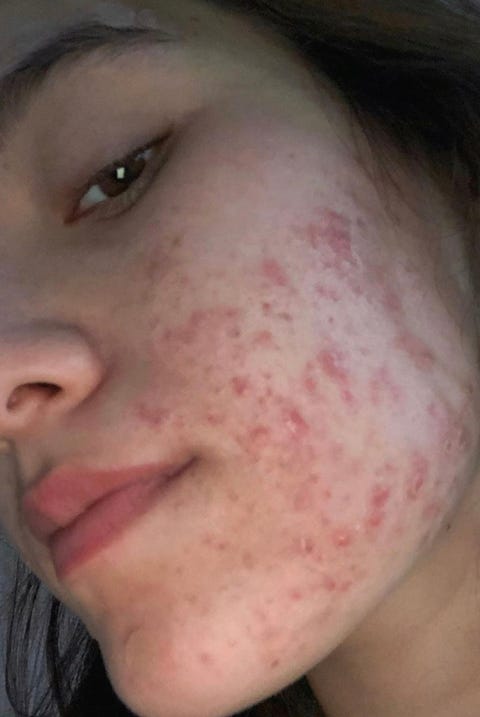
Courtesy Image
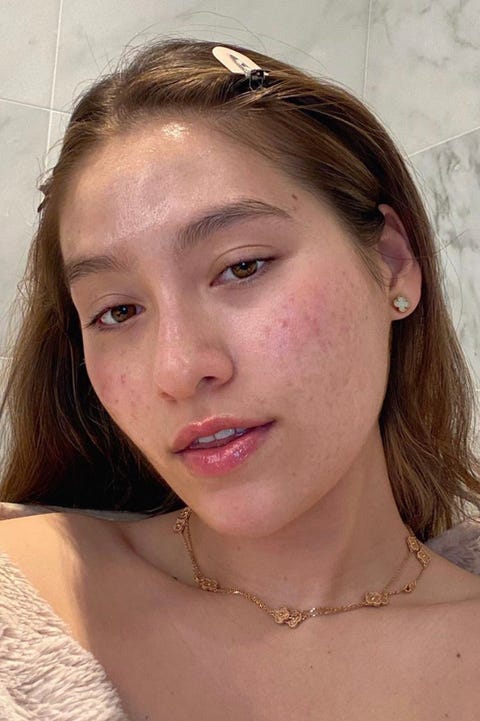
Courtesy Image
✨ 11 months post-Accutane ✨
I got my first breakout when I was 12 years old, and for the next five years, I was in a constant battle with my skin. I tried everything under the sun to treat it: antibiotics, topical creams, chemical peels, veganism, hormonal pills, spironolactone, cortisone shots, lasers—everything. I was eventually diagnosed with polycystic ovary syndrome, or PCOS, a hormonal disorder that can cause—among other things—persistent acne. I knew then that I had to take the leap and try isotretinoin.
This content is imported from Instagram. You may be able to find the same content in another format, or you may be able to find more information, at their web site.
I was on it for eight months total: For the first three months, I took 40mg, then 60mg for the last five months. I had dry everything—face, lips, eyes, scalp, body—and my hair started shedding a bit, too. I'm prone to headaches, but Accutane really exacerbated the symptoms, and my head would often feel like it was crushing in on itself. It was all an emotional roller coaster for me. I'm not sure if it was the medicine or my personal life or both, but I definitely think I was more emotionally fragile while I was on it.
About two months after I finished Accutane, I saw the severity of my migraines, dry eyes, and dry scalp decrease. After four months, my emotional health evened out and I felt back to my old self. As for my skin, I'm now experiencing breakouts all along the lower half of my face and around my hairline. Thankfully, they're much more minor than before—just small whiteheads and blackheads—and truthfully, they could also just be a side effect of going off birth control a few months ago.
It sounds weird, but I really think I was meant to get severe acne. My journey taught me so much about myself: to love myself and be confident, no matter the condition of my skin. Yes, it was so hard, but I wouldn't change a thing. And I would 100 percent consider going back on isotretinoin again if I needed to.
A dermatologist's take:
If the idea of potentially losing your hair on Accutane freaks you out, take deep breaths: "If any hair loss occurs, it's generally temporary," says Dr. Garshick. " One study showed that isotretinoin doesn't affect hair loss if the dose is low enough."
Dr. Gohara agrees, stating that "less than 10 percent" of her patients see this side effect, and if they do, "it's usually because the hair is drier and more fragile from the medication, and nine times out of ten, it slowly grows back totally normal," she says. "Once the Accutane's out of your system, hair and nails are always laggy in terms of regenerating themselves."

Courtesy Image

Courtesy Image
✨ One year post-Accutane ✨
I suffered with severe acne for three years before deciding to try isotretinoin. My breakouts were super oily, sore, and red no matter what I put on them, and kids at school would call me Braille face. I didn't take Accutane just that one time, though—I ended up taking it three times over the next few years.
The first two times, my acne slowly got worse over six months, then came back as bad as before. My dermatologist even switched up the dosing each time: My first course, I slowly reached 60mg a day; my second course, we took the approach of 10mg a day for a longer period of time; and my third course, I slowly reached 60mg again.
But after my third round, my skin was still incredibly oily and broken out. I remember sitting in my dermatologist's office as he explained that Accutane hadn't worked how it should have. He apologized and said there was nothing else he could offer me. I cried the whole way home. But then, strangely, my skin began to clear up a few months later, almost like a delayed effect. Now, my skin is totally clear, and I don't have any active acne.
This content is imported from Instagram. You may be able to find the same content in another format, or you may be able to find more information, at their web site.
Even though Accutane eventually worked for me, it wasn't an easy journey. I honestly had almost every side effect in the book: dryness, eczema, rashes, body soreness, fatigue, blurred vision, headaches, nosebleeds, stomach problems, hair loss, irritability, and brain fog. Even my vision was still a little blurry until this past summer. But recently, I went to an ophthalmologist who reassured me that my vision is officially back to 20/20.
If you do decide to go on isotretinoin, I have two words of advice: 1) Take progress pictures! I promise you will not notice how much your skin has changed without them, and they'll really help you stay positive; and 2) Listen to your body. It's so important to rest when you need it, and say no to going out if your body needs it. I tried to push myself over and over again, and I ended up worse off in the end.
A dermatologist's take:
"There are certainly people who take longer to respond to Accutane," says Rachel Nazarian, MD, a dermatologist with Schweiger Dermatology in New York City. "This may be due to their own natural resistance, or due to their doctor's dosing regimen, but it's important to remember that even when you stop taking the pills, the medication continues to stay in your system for weeks. So some people may actually start to show improvement around this 'tail end' of treatment."
FYI: These will help keep you clear even after Accutane
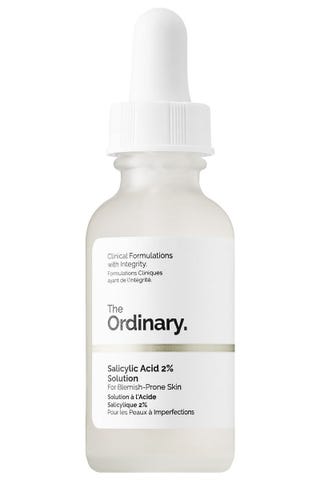
Salicylic Acid Serum
The Ordinary Salicylic Acid 2% Solution
Use this 2 percent salicylic acid serum all over or as a spot treatment to keep pores clear of acne-causing sebum and dead skin cells.
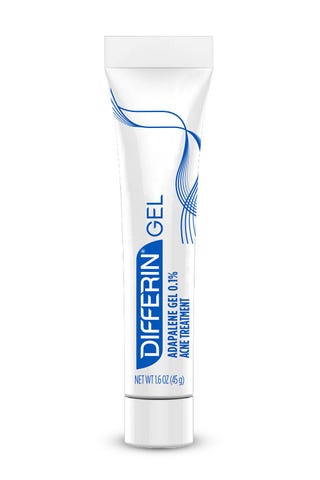
Adapalene Gel
Differin Adapalene Gel 0.1% Acne Treatment
This retinoid gel treats acne in two ways: 1. It boosts cell turnover to keep pores clear and 2. It reduces inflammation associated with breakouts. It's strong though, so use it only every three days for the first few months.
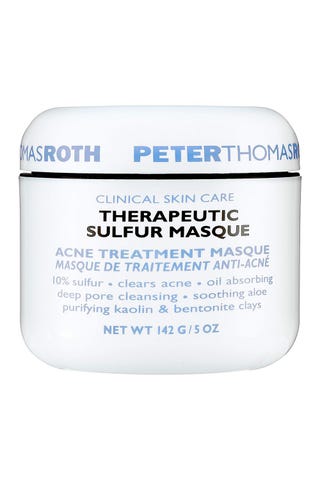
Sulfur Mask
Peter Thomas Roth Therapeutic Sulfur Masque
10 percent sulfur in this mask deep-cleans pores, absorbs excess oil, and eliminates bacteria. For best results, apply it on clean skin for 10 minutes twice a week.
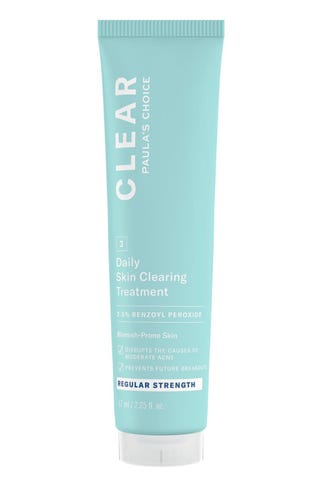
Benzoyl Peroxide
Paula's Choice Daily Skin Clearing Treatment
amazon.com
BP is gold when it comes to killing acne-causing bacteria. It's used here in a 2.5 percent concentration, which is is proven to be as effective as higher doses—just less irritating.
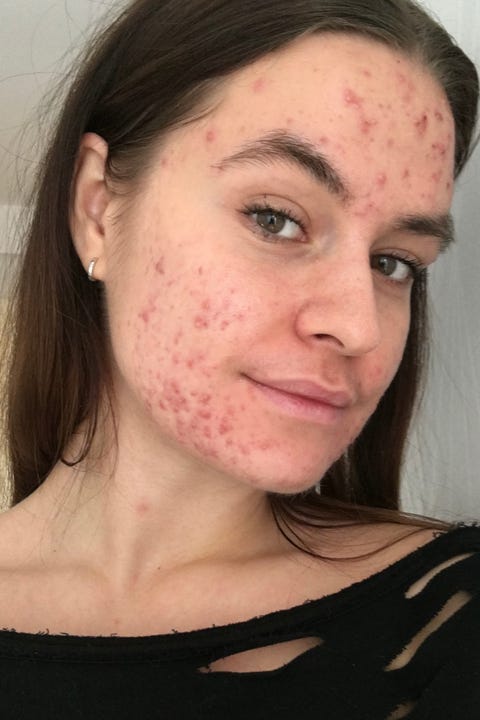
Courtesy Image
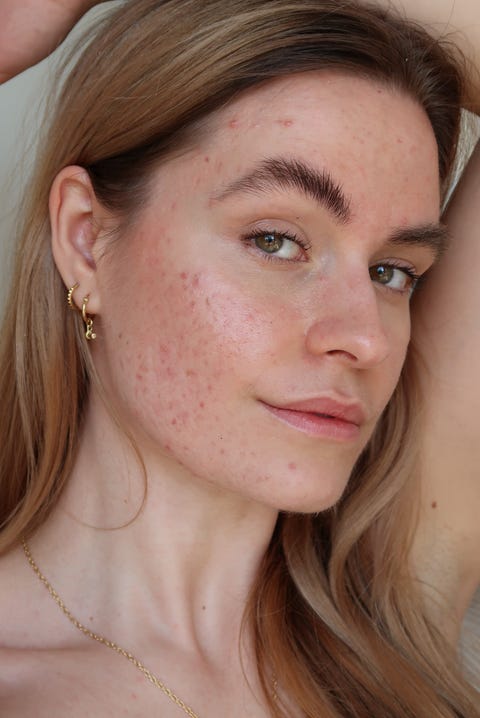
Courtesy Image
✨ 1.5 years post-Accutane ✨
Before Accutane, I used to have severe acne—mostly concentrated on my cheeks and forehead, but also along my neck, chest, and back. I took 50mg for the majority of my isotretinoin treatment, and luckily, my side effects didn't affect my day-to-day life that much: My eyes, lips, face, and entire body were dry; I had the odd headache here and there; and toward the end of treatment, I got some joint and back pain.
This content is imported from Instagram. You may be able to find the same content in another format, or you may be able to find more information, at their web site.
For the first month of treatment, my skin also went through the initial purging period, meaning my acne got significantly worse (like, it doubled in severity) before it started to calm down again. Those first few months were 100 percent the hardest to endure, but I look back at it all with gratitude. Even though my acne did come back six months after finishing Accutane, it's nowhere near as severe—I'd say my skin is 60-70 percent better than it was before.
Overall, I'm really lucky to have had such a positive experience, with very minor and manageable side effects. When my acne was at its peak severity, my mental health truly suffered in all ways imaginable. So if my skin ever came to affect me the way it did prior to isotretinoin, I would probably go on it again.
A dermatologist's take:
"In terms of purging, I'd say a third of my patients see their acne get worse in those first few months of taking Accutane, while a third see nothing happen at all, and the last third say, 'This is the best thing that's ever happened,'" says Dr. Gohara. "For most people, after month three, their improvement takes off like wildfire."

Courtesy Image

Courtesy Image
✨ 2.5 years post-Accutane ✨
Before isotretinoin, I had severe cystic acne on my face, chest, arms, and back. Every time my skin bumped against something, it felt like somebody had poked the most sensitive blister. My acne would then form keloid scars, which I still have all over my shoulders and back.
I decided to go on Accutane in the fall of 2017. I started with a low dosage twice a day, then was upped to a stronger dose once a day after a few months. The strongest side effect I had was dry skin: My scalp and nose were always dry and itchy, and my lips were constantly cracked. The second side effect was a lower alcohol tolerance. I remember going out with friends early on in my Accutane journey, drinking just a few drinks, and getting a terrible hangover and headache that lasted way longer than my usual hangovers. Thankfully, these were my only two big side effects, and they went away on their own within two months after treatment.
Because my body tolerated Accutane so well and the results were so excellent, I finished after six months rather than the anticipated nine. I'm so happy I did it, and I wish I hadn't been so scared in the first place. The best part is that my skin isn't constantly inflamed anymore—I can wear makeup, bras, and whatever clothes I want without being in constant pain. And now, whenever I do get the occasional pimple, I'm not worried that I'm about to face clusters of inflammation for months.
A dermatologist's take:
"In general, it's recommended that people avoid alcohol while on isotretinoin," says Dr. Garshick. Not only does Accutane already put a bunch of stress on your liver (which is the same organ responsible for processing all those White Claws you drink), but it also dries your body out. Basically, you're setting yourself up to have a major hangover the next day.

Courtesy Image

Courtesy Image
✨ Four years post-Accutane ✨
I used to have patches of painful cysts and nodules underneath my skin that didn't respond to regular acne treatments. I grew up in a beach town and would wear a full face of makeup to the beach, or beg not to go to school because I was having a particularly bad skin day.
I ended up doing two rounds of isotretinoin about four years apart. The first time, it worked perfectly, and I didn't have a single pimple for three years. Over time, though, my acne came back even worse and more painful than before, so I ended up doing a second round of treatment. It's been about four years since I finished, and while I still get an occasional pimple, my acne hasn't come back at all. I have no residual effects from the medication, and all of my deep acne scars have gone away, too.
For me, the biggest side effects I dealt with were an extremely dry nose and lips, and I had large patches of cracked and scaly skin. But all of it started to go away within a few weeks after I finished the medication. I honestly wouldn't hesitate to go back on isotretinoin if my acne came back, though. The five or six months of uncomfortable side effects didn't outweigh the great benefits for me.
A dermatologist's take:
As Dr. Gohara said, very few (five percent, if she had to guess) of her patients go on Accutane a second time, while the vast majority never see a major breakout again. Again, your results will vary, but rest assured most patients see life-changing improvements with a course of isotretinoin.
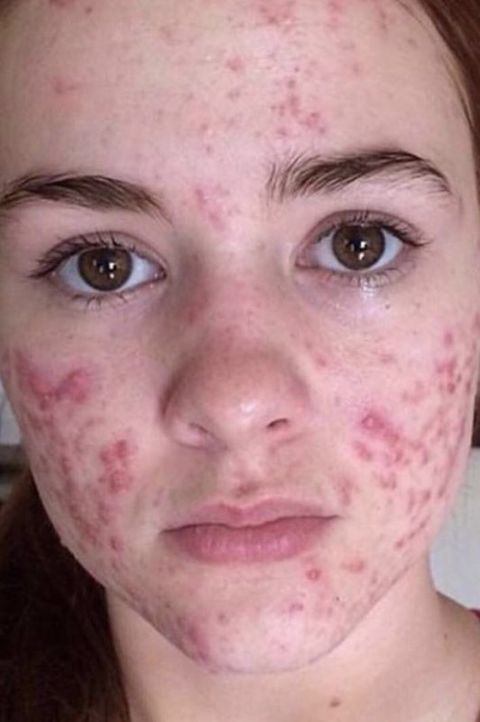
Courtesy Image

Courtesy Image
✨ Five years post-Accutane ✨
Before isotretinoin, I had severe cystic nodular acne, mostly on the lower half of my face, that wouldn't respond to typical acne treatments. The bumps under my skin were so large and sore that I ended up going on 60mg of Accutane in 2015. Throughout my six-month dose, everything was dry—my eyes, the insides of my nose (to the point of occasional nosebleeds)—and my joints were super stiff and achy, especially in the morning and at night. Even bending down and picking something up was harder on Accutane; I had to move slower because of how stiff I felt.
This content is imported from Instagram. You may be able to find the same content in another format, or you may be able to find more information, at their web site.
Thankfully, all of my side effects ended quickly, just a few weeks after I stopped taking the pill, but my acne started to come back six months later. In the end, I decided not to go on another dose of Accutane, though, since my acne is so hormonally driven that I feel like it wouldn't have helped. I still have acne five years later, but I've found more natural ways to treat it over the years, and it's nowhere as severe as it was before.
Even though it didn't work for me, I'm still really grateful I took isotretinoin. Without it, I wouldn't have started my Instagram account @myfacestory and wouldn't have connected with all the people I've had the opportunity to meet online and in person. The fact that Accutane didn't work for me ended up being my gateway to skin positivity; it helped me accept and love my skin no matter what it looks like.
A dermatologist's take:
Ask a dozen dermatologists for their thoughts on isotretinoin and hormonal acne, and you'll probably get a 50/50 split in opinions. Some dermatologists believe isotretinoin isn't super effective for hormonal acne in women, but Dr. Gohara (and many others) disagrees.
"We know that acne is caused by a hormonal surge that triggers your oil glands to produce oil, allowing bacteria to settle in and create inflammation," says Dr. Gohara, "so it simply doesn't make sense to me that this process wouldn't respond well to isotretinoin. I think that in the cases where a patient's skin isn't responsive to Accutane, it's because that person's body just isn't responsive to Accutane—which can happen in some people."

Courtesy Image

Courtesy Image
✨ Eight years post-Accutane ✨
The best way I could describe my skin prior to isotretinoin is...painful. There was a period of at least five years where I don't remember waking up without my face hurting. I actually got fired from a job at a beauty counter in college because the manager thought I made a bad impression on customers because of how my skin looked.
Accutane ended up working really quickly and really successfully on my acne, but I also had virtually every side effect—the most annoying of which was the dry skin. I needed to apply lotion to my face, hands, and body all the time, and I dealt with horrible joint pain, especially in my hips. Because isotretinoin dries up a lot of your body's natural moisture and lubrication, even my anus (yup) was dry, which meant taking a sh*t was one of the most painful experiences of my life.
I also experienced suicidal thoughts and ideations toward the end of my treatment, but I didn't want my derm to pull me off the meds—at that point in my life, I thought my skin was more important than my mental health, but I should have been upfront with my dermatologist (I absolutely don't recommend this dangerous behavior, FYI).
Within six months, my acne cleared up, and my dermatologist decided I no longer needed to take isotretinoin. All of my side effects disappeared within a month, except for the depression. To be fair, I've always had depression in some form, but I had never had suicidal ideations until I was on isotretinoin. Still, as awful as some of my side effects were, I don't regret a second of it. I was so self conscious about my skin that I used to hide in the bathroom and cry. I truly believe that Accutane was the only viable treatment for my cystic acne.
A dermatologist's take:
According to Dr. Nazarian, less than one percent of her patients experience mental health symptoms while on isotretinoin. As for Dr. Gohara, "scientifically, there's no correlation between isotretinoin and depression or anxiety, but anecdotally, I see it in 10 percent or less of patients," she says. "If somebody has a pre-existing mental health condition or is seeing a mental healthcare provider, I make sure that provider is on board with Accutane before I even start it, and that we are in really close contact so we can quickly lower the patient's dose or come off of the medication ASAP if need be."
If you or someone you know is considering suicide, call the National Suicide Prevention Lifeline at 800-273-8255 or contact the Crisis Text Line by texting HOME to 741-741.
Kate Foster Kate Foster is a freelance beauty writer in New York City.
Chloe Metzger Deputy Beauty Director Chloe Metzger is the deputy beauty director at Cosmopolitan, obsessively writing about new makeup launches, the best hair products (curly girl here; whattup), and the skincare formulas that really work for every skin type (follow her on Instagram to see behind-the-scenes pics of that magazine life).
This content is created and maintained by a third party, and imported onto this page to help users provide their email addresses. You may be able to find more information about this and similar content at piano.io
How Long Does It Take Accutane To Clear Up Acne
Source: https://www.cosmopolitan.com/style-beauty/beauty/a34465646/accutane-before-after-results-side-effects/
Posted by: harrisdonelly.blogspot.com

0 Response to "How Long Does It Take Accutane To Clear Up Acne"
Post a Comment